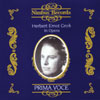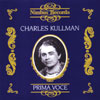Herbert Ernst Groh in Opera
Two from the Tauber school revisited to produce some lovely singing
View record and artist detailsRecord and Artist Details
Composer or Director: Adolphe (Charles) Adam, Giacomo Puccini, Georges Bizet, Wolfgang Amadeus Mozart, Friedrich (Adolf Ferdinand) von Flotow, Richard Wagner, Wilhelm Kienzl, Giuseppe Verdi, Ruggiero Leoncavallo, (Charles Louis) Ambroise Thomas, Richard Strauss, Pietro Mascagni, Jacques Offenbach, Gioachino Rossini
Genre:
Opera
Label: Prima Voce
Magazine Review Date: 4/2007
Media Format: CD or Download
Media Runtime: 77
Mastering:
Mono
ADD
Catalogue Number: NI7934

Tracks:
| Composition | Artist Credit |
|---|---|
| (Die) Entführung aus dem Serail, '(The) Abduction from the Seraglio' |
Wolfgang Amadeus Mozart, Composer
Berlin Staatsoper Orchestra Herbert Ernst Groh, Tenor Robert Heger, Conductor Wolfgang Amadeus Mozart, Composer |
| (Die) Zauberflöte, '(The) Magic Flute', Movement: Dies Bildnis ist bezaubernd schön |
Wolfgang Amadeus Mozart, Composer
Berlin Staatsoper Orchestra Herbert Ernst Groh, Tenor Robert Heger, Conductor Wolfgang Amadeus Mozart, Composer |
| Semiramide, Movement: Qual densa notte! |
Gioachino Rossini, Composer
Gioachino Rossini, Composer Herbert Ernst Groh, Tenor Otto Dobrindt, Conductor |
| (Le) Postillon de Lonjumeau, Movement: Mes amis, écoutez l'histoire (Freunde, vernehmetichte) |
Adolphe (Charles) Adam, Composer
Adolphe (Charles) Adam, Composer Herbert Ernst Groh, Tenor Otto Dobrindt, Conductor |
| Mignon, Movement: Adieu, Mignon! Courage! |
(Charles Louis) Ambroise Thomas, Composer
(Charles Louis) Ambroise Thomas, Composer Frieder Weissmann, Conductor Herbert Ernst Groh, Tenor |
| Alessandro Stradella, Movement: ~ |
Friedrich (Adolf Ferdinand) von Flotow, Composer
Friedrich (Adolf Ferdinand) von Flotow, Composer Herbert Ernst Groh, Tenor Otto Dobrindt, Conductor |
| Martha, Movement: ~ |
Friedrich (Adolf Ferdinand) von Flotow, Composer
Friedrich (Adolf Ferdinand) von Flotow, Composer Herbert Ernst Groh, Tenor Otto Dobrindt, Conductor |
| (Les) Pêcheurs de Perles, '(The) Pearl Fishers' |
Georges Bizet, Composer
Georges Bizet, Composer Herbert Ernst Groh, Tenor Otto Dobrindt, Conductor |
| (Der) Fliegende Holländer, '(The) Flying Dutchman', Movement: Mit Gewitter und Sturm |
Richard Wagner, Composer
Herbert Ernst Groh, Tenor Otto Dobrindt, Conductor Richard Wagner, Composer |
| (Die) Meistersinger von Nürnberg, '(The) Masters, Movement: Morgenlich leuchtend (Prize song rehearsal) |
Richard Wagner, Composer
Herbert Ernst Groh, Tenor Otto Dobrindt, Conductor Richard Wagner, Composer |
| Pagliacci, 'Players', Movement: ~ |
Ruggiero Leoncavallo, Composer
Frieder Weissmann, Conductor Herbert Ernst Groh, Tenor Ruggiero Leoncavallo, Composer |
| Madama Butterfly, Movement: ~ |
Giacomo Puccini, Composer
Berlin Staatsoper Orchestra Giacomo Puccini, Composer Herbert Ernst Groh, Tenor Maria Cebotari, Soprano Robert Heger, Conductor |
| (Der) Rosenkavalier, Movement: Di rigori armato |
Richard Strauss, Composer
Herbert Ernst Groh, Tenor Otto Dobrindt, Conductor Richard Strauss, Composer |
| (Der) Evangelimann, Movement: ~ |
Wilhelm Kienzl, Composer
Anonymous Organists(s), Organ Goedel-Dreising Children's Chorus Herbert Ernst Groh, Tenor Odeon Künstlerorchester Otto Dobrindt, Conductor Wilhelm Kienzl, Composer |
| (La) traviata, Movement: ~ |
Giuseppe Verdi, Composer
Frieder Weissmann, Conductor Gitta Alpar, Soprano Giuseppe Verdi, Composer Herbert Ernst Groh, Tenor |
| (Les) Contes d'Hoffmann, '(The) Tales of Hoffmann', Movement: Antonia - Leise tönt meiner Stimme Klang |
Jacques Offenbach, Composer
Emmy Bettendorf, Soprano Frieder Weissmann, Conductor Herbert Ernst Groh, Tenor Jacques Offenbach, Composer |
| (Les) Contes d'Hoffmann, '(The) Tales of Hoffmann', Movement: Ha Wie in meiner seele (Hoffmann's Aria) |
Jacques Offenbach, Composer
Frieder Weissmann, Conductor Herbert Ernst Groh, Tenor Jacques Offenbach, Composer |
| Aida, Movement: ~ |
Giuseppe Verdi, Composer
Berlin Städtisches Orchestra Giuseppe Verdi, Composer Herbert Ernst Groh, Tenor Otto Dobrindt, Conductor |
| Cavalleria rusticana, Movement: O Lola ch'ai di latti fior di spino (Siciliana) |
Pietro Mascagni, Composer
Berlin Städtisches Orchestra Herbert Ernst Groh, Tenor Otto Dobrindt, Conductor Pietro Mascagni, Composer |
| Cavalleria rusticana, Movement: Mamma, quel vino è generoso. |
Pietro Mascagni, Composer
Berlin Städtisches Orchestra Herbert Ernst Groh, Tenor Otto Dobrindt, Conductor Pietro Mascagni, Composer |
| (La) forza del destino, '(The) force of destiny', Movement: ~ |
Giuseppe Verdi, Composer
Gerhard Hüsch, Baritone Giuseppe Verdi, Composer Herbert Ernst Groh, Tenor Otto Dobrindt, Conductor |
Composer or Director: Giuseppe Verdi
Genre:
Opera
Label: Prima Voce
Magazine Review Date: 4/2007
Media Format: CD or Download
Media Runtime: 78
Mastering:
Mono
ADD
Catalogue Number: NI7938

Tracks:
| Composition | Artist Credit |
|---|---|
| Aida, Movement: ~ |
Giuseppe Verdi, Composer
Berlin State Opera Orchestra Charles Kullman, Tenor Erich Orthmann, Conductor Giuseppe Verdi, Composer |
Author: John Steane
Of Groh’s recordings, the farewell from Mignon is as good an example as any, voice and music perfectly suited. The romance from Les pêcheurs de perles is another lovely example, as is the rare Semiramide aria, so mellifluous and Italianate in performance. Duets with Emmy Bettendorf and Gerhard Hüsch are also models of graceful, well schooled singing, and though the solos from Die Meistersinger, Aida and Pagliacci are not his by nature, he makes a well mannered show of compatibility.
Kullman has much more naturally the measure of his “Holde Aida” and “Morgenlich leuchtend”. There is power in his voice but also a velvety softness, which he uses to a seductively romantic effect in Vladimir’s cavatina from Prince Igor and in the many items from operetta included here. It’s notable too that while both sing the Italian tenor’s aria from Der Rosenkavalier with delightful evenness and thrilling high notes, Groh’s pronunciation and phrasing are provincial compared with Kullman, who gets them right.
But I fancy it is another consideration which will make Kullman’s disc the more satisfactory proposition for most likely buyers. That is the superiority of sound in terms of original recording and transfer. Nimbus’s new method does Groh no favours: as 78s his records can play beautifully but here the process brings out from time to time an edgy hardness.
Personally, I valued the “old” Nimbus method partly because it was on its own and offered an alternative, and partly because most modern equipment bought in the shops is so hard and unkind to voices and old recordings that the Prima Voce series was about the one thing it couldn’t distort. Now that is gone, and the new method sounds, in kind, like all the rest.
Discover the world's largest classical music catalogue with Presto Music.

Gramophone Digital Club
- Digital Edition
- Digital Archive
- Reviews Database
- Full website access
From £8.75 / month
Subscribe
Gramophone Full Club
- Print Edition
- Digital Edition
- Digital Archive
- Reviews Database
- Full website access
From £11.00 / month
Subscribe
If you are a library, university or other organisation that would be interested in an institutional subscription to Gramophone please click here for further information.




